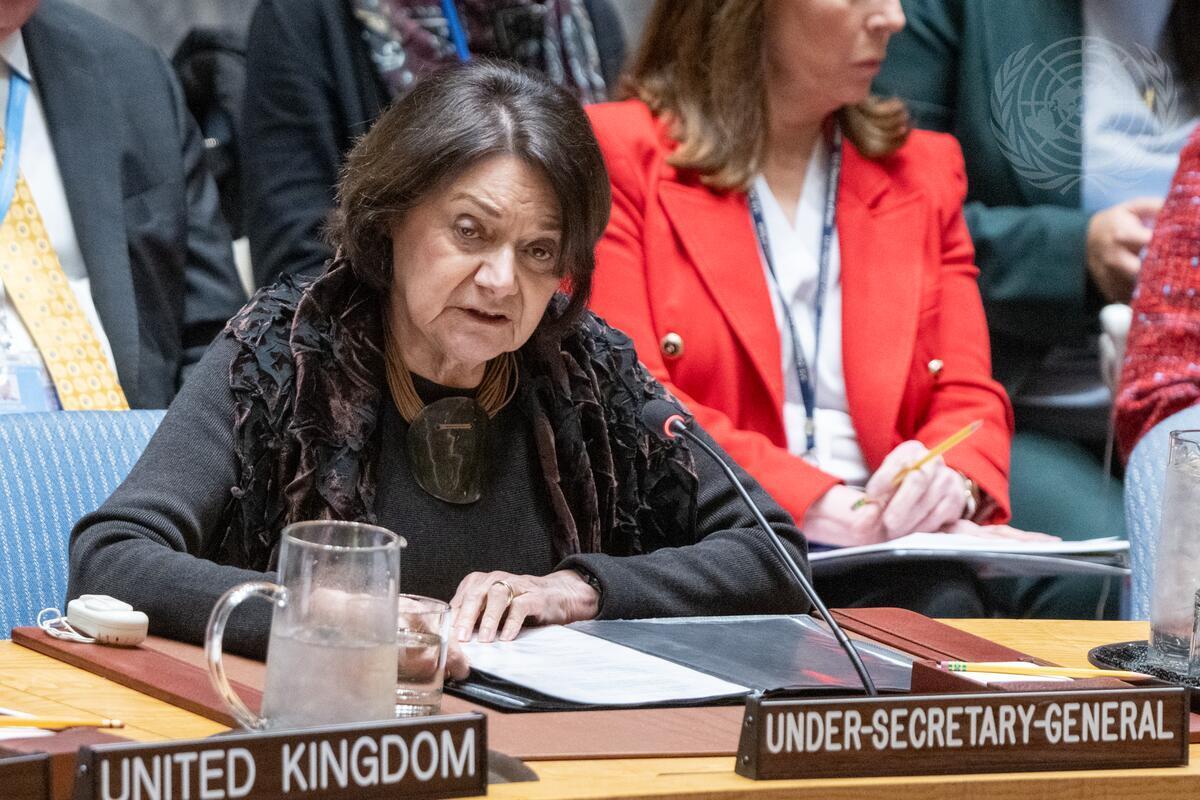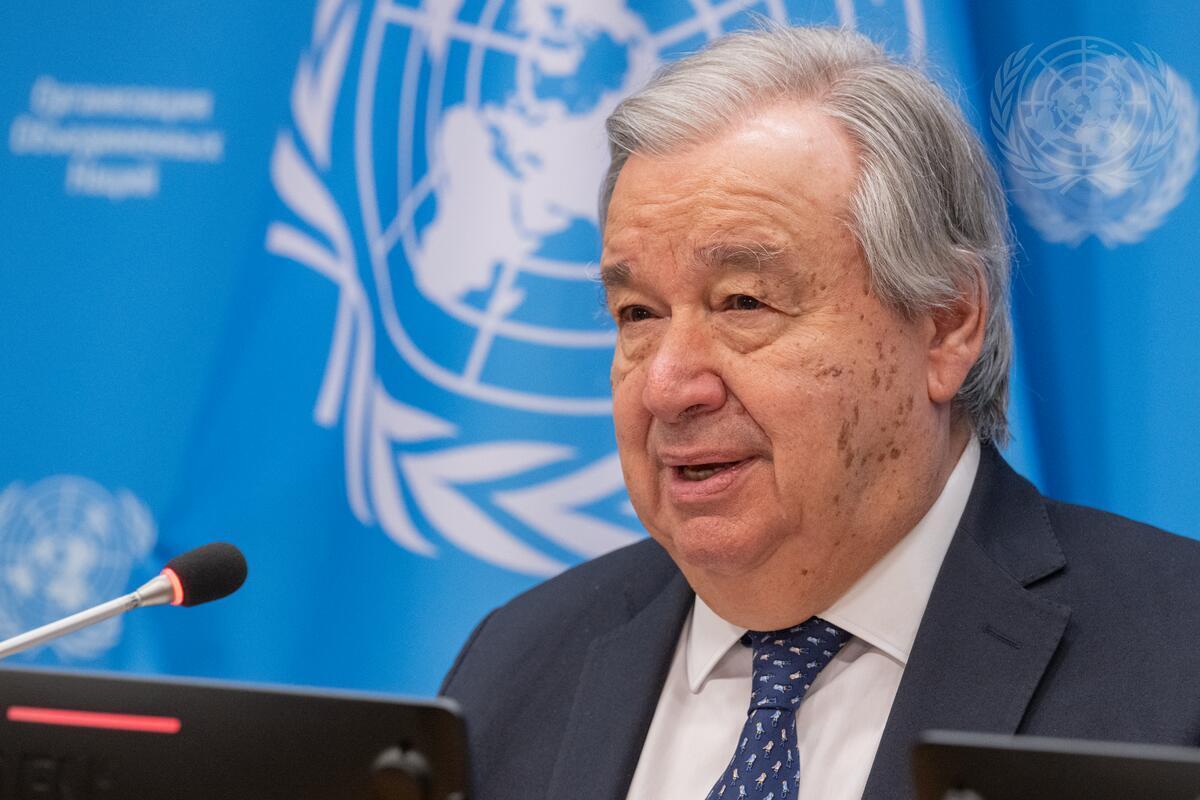Mr. President,
Members of the Security Council,
I brief you today as we continue to confront a growing humanitarian, security and political crisis in Gaza and the West Bank, including East Jerusalem.
The prospect of sustainable peace is fading by the day as the specter of violence and radicalism grows. Our efforts today are focused on the immediate challenges – on preventing the risk of an economic and humanitarian implosion in the West Bank and Gaza and on preserving the hope – slim as it is – that Israelis and Palestinians will be able to live in peace, side by side, in states of their own that are recognized and integrated into the global and regional community. We are working hard to preserve this prospect as the viability of the two-state solution is systematically eroded by the deteriorating reality on the ground. Extremists are on the rise again and the risk of war continues to loom large. For Israelis and Palestinians to get back on track for a peaceful resolution of the conflict, the first thing that is required is leadership.
Leadership that believes peace is possible through negotiations.
Leadership and an international community that is committed to supporting both parties to reach agreement on the basis of relevant UN resolutions and bilateral agreements.
An international community that understands that the weaker party – the Palestinian people who have lived under occupation for more than fifty years – need our support more than ever.
It should never be about Israel or Palestine, it should be about Israel and Palestine.
Mr. President,
Unfortunately, unilateral measures, continuing violence, financial pressures, and the lack of progress towards peace are exacting a heavy toll on Palestinian society and undermining the foundations of peace.
In 2018, the Palestinian Authority (PA) had a budget deficit of some USD 1.04 billion, over 60 percent of which was covered by donor aid. This shortfall is expected to increase in 2019 because of the withdrawal of significant amounts of donor funding and a worsening economic situation.
Earlier this week the Government of Israel decided unilaterally to withhold some USD 140 million in Palestinian tax revenue transfers. This decision is a result of legislation adopted by the Knesset last year that instructs the Government to withhold money equivalent to what the PA pays to Palestinians convicted by Israeli courts of involvement in terrorism or other security-related offenses, and to their families.
Today the Palestinian leadership is meeting to discuss its financial and political response to this move.
These are very serious developments that put at risk the financial stability of the Palestinian Authority and ultimately the security of both Israelis and Palestinians alike. The Secretary-General has repeatedly warned that unilateral moves undermine the chances for peace.
The recent halting of U.S. assistance to Palestinians may also impact ongoing efforts to bridge existing divisions. The ending of vital training, facilities, and equipment support, could potentially risk security coordination. I encourage ongoing efforts to ensure that this critical assistance is continued.
The important work being carried out by civil society organizations working towards peace is also under threat and I hope that donors will continue their support to civil society, which serves a critical role in preserving the fraying links between Israelis and Palestinians.
We also regret Israel’s recent decision on 28 January not to renew the mandate of the Temporary International Presence in Hebron (TIPH), established pursuant to the provisions of the 1995 Interim Agreement (aka Oslo II Accord) between Israel and the Palestine Liberation Organization (PLO). I echo the Secretary-General’s appreciation for their service and the generous contribution of all participating countries over the years. The United Nations continues to engage with relevant Member States and the parties on the ground to ensure the protection, safety, and wellbeing of civilians in Hebron, and the rest of the occupied Palestinian territory
Mr. President,
Alongside these worrying developments, and despite the concerted efforts of Egypt to bring the Palestinian factions together, recent political moves may further widen the growing divide between the West Bank and Gaza.
On 27 January the Fatah Central Committee recommended the formation of a new government comprising PLO factions and independent figures. On 29 January, Prime Minister Hamdallah’s cabinet submitted its resignation. Consultations on the way forward continue, including on holding long overdue legislative elections. Hamas and the other factions have called, instead, for the formation of a government of national unity with the task of organizing legislative, presidential and Palestinian National Council elections.
Elections conducted in line with Palestinian laws and with established international democratic standards throughout the occupied Palestinian territory may now be the only way out of the current internal political impasse.
As the Palestinian political dynamics evolve, and as we drift further away from the realization of a negotiated two-state solution, I again call on Israeli and Palestinian leaders to re-commit to the principles and vision enshrined a quarter of a century ago in relevant UN resolutions and bilateral agreements.
Last month I outlined some steps that are necessary to support the stability of the Palestinian Authority, including: expanding opportunities for free trade; addressing fiscal leakages; enabling the Palestinian Government to increase the services that it provides to its people; and ensuring continued security coordination. Such steps are not a substitute for peace. They must be matched by political moves, including ceasing the policy of settlement construction and expansion, and the designation of land for exclusive Israeli use, as well as creating opportunities for Palestinian development in Area C. In this context, I reiterate that settlements are illegal under international law and remain a substantial obstacle to peace.
In the absence of final status negotiations, such steps should significantly support Palestinian institution-building and improve lives. The United Nations, together with our partners in the AHLC format, will continue working to create an environment conducive to such developments.
Meanwhile, Mr. President,
In Gaza and the West Bank, including East Jerusalem, 11 Palestinians have been killed during the reporting period by the Israeli security forces (ISF) in various incidents, including attacks on Israeli civilians, demonstrations, clashes, and military operations.
On 7 February, an Israeli teenager was murdered in a park outside Jerusalem by a Palestinian perpetrator, who was later arrested by Israeli security forces.
There is no justification for violence and terror.
Meanwhile protests and violent incidents at the Gaza fence continued with seven Palestinians, including three children, killed by Israeli live fire on 8 February. This brings to 40 the number of children killed in the context of Gaza protests since they began in March 2018. Children must not be targeted or put in harm’s way. They must be protected. Lethal force should be used only as a last resort.
During the reporting period, Palestinian militants fired 18 rockets towards Israel. The indiscriminate launching of rockets, mortars and incendiary kites or balloons from Gaza must stop. Hamas must ensure that protests remain peaceful and prevent provocations near the fence, including attempts to breach it.
In the West Bank this past month, Israeli forces killed four Palestinians, including two children.
Demolitions and seizures of Palestinian-owned structures also continued across the occupied West Bank, including East Jerusalem. Thirty-nine structures were demolished or seized by the authorities or by their owners upon receipt of a demolition order, resulting in the displacement of 70 people. Overall, some 200 Palestinian households in East Jerusalem have eviction cases filed against them, mostly by Israeli settler-related organizations, placing some 900 people at risk of displacement.
The upsurge in settler violence over the past year continues to be a serious concern. During the reporting period, OCHA has recorded 20 incidents in which Israeli settlers injured Palestinians or damaged their property.
On 26 January, armed Israelis entered Al Mughayyir village near Ramallah, where they attacked Palestinian residents; ensuing clashes, also involving the IDF, resulted in the killing of a 38-year-old Palestinian man, and the injury of 15 others.
Mr. President,
For years we have described the situation facing the population and focused on the urgency of providing Palestinians confined within Gaza’s boundaries with the means to live a dignified life and to have hope for the future.
Hamas’ continuing control of Gaza, Israel’s severe movement and access restrictions, and the Palestinian Authority’s restrictive measures are pushing the situation to a breaking point. The militant build-up continues as the risk of ever more radical and extremist groups pushing both sides into war, and that risk grows by the day. With the prospects of intra-Palestinian reconciliation dimming, the people of Gaza feel more and more left to their own devices -- with no representation, no relief, and no way out.
On 5 February, the PA paid its employees in Gaza reduced salaries for the month of January and reportedly over 5,000 employees did not receive salaries or other payments due.
Despite the difficulties, however, the UN continues its efforts to implement the package of urgent humanitarian and economic interventions in Gaza called for at the September AHLC meeting in New York. The State of Qatar has donated an additional USD 20 million to expand UN cash-for-work programming in Gaza. This will create some 10,000 new temporary jobs in Gaza. The World Bank has also launched its USD 17 million cash-for-work programme which will create another 5,000 temporary jobs.
Job creation is critical to the stabilization of Gaza’s economy. However, all our efforts are short to medium term only.
Ultimately, only sustainable political solutions – including reuniting Gaza and the West Bank under a single, democratic and legitimate Palestinian government and ending the closures of the Strip – will genuinely change the current course.
I welcome the tireless efforts of Egypt to continue dialogue with Palestinian factions with the aim of maintaining stability in Gaza and achieving genuine reconciliation. I urge all parties to remain engaged in this critical effort.
Mr. President,
Turning to the region very briefly, recent incidents that occurred on the Golan heightening tensions between Israel and Syria are also of concern. On 11 February, UNDOF observed, in several separate incidents, the Israel Defense Forces firing tank and high explosive rounds into the area of separation, which was followed by three rockets fired into a different part of the area of separation. These developments undermine the 1974 Disengagement of Forces Agreement and jeopardize the long-standing ceasefire between Israel and Syria.
Lebanon, meanwhile, has formed a Government on 31 January 2019, almost nine months after the last Parliamentary elections. The Cabinet has adopted a ministerial statement that laid out a wide-ranging economic reform agenda. This was followed by a vote of confidence on 15 February, for which the Government gained majority support of 111 out of 128 votes.
The situation in southern Lebanon and along the Blue Line remained generally calm and on 13 February, UNIFIL facilitated the second tripartite meeting of this year. UNIFIL has also requested to visit and independently verify the sixth tunnel that the IDF had discovered in January, but has yet to receive a date for an assessment.
Mr. President,
In closing, I have repeatedly raised the alarm on the dangerous trajectory of the Israeli - Palestinian conflict.
The United Nations, and its partners, have provided a series of recommendations that, if implemented effectively, would begin to establish an environment conducive to a return to negotiations. We have advocated for a strengthened commitment to bilateral agreements; we are implementing a series of humanitarian interventions aimed to stabilize Gaza, support Palestinian reconciliation and ultimately lift the closures; and we have continued to stress that the 2016 Quartet Report recommendations remain deeply relevant.
What is needed, first and foremost, is the necessary leadership and political will for change. Until that can be found, Palestinians and Israelis will continue to slide into increasingly hazardous territory.
Thank you.






